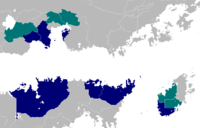Balak language
| Balak | |
|---|---|
| Balákzem . Balaakzem . | |
| Pronunciation | /bɑˈlak.zɛm/ |
| Region | Vaniua |
| Ethnicity | Balaks |
| Native speakers | 57 million (2016) |
| Language family | |
| Early forms: | Proto-Vaniuan
|
| Writing system | Vaniuan script |
| Official status | |
| Official language in | Balakia |
| Regulated by | Institute of Balak Language and Linguistics at the University of Yercésven |
| CWS code | bks |
 Location of Balak speakers in Vaniua regions where Standard Balak is the language of the majority regions where Standard Balak is the language of a significant minority regions where Chindushi is the language of the majority regions where Chindushi is the language of a significant minority | |
Balak (. Balaakzem .; Balákzem, /bɑˈlak.zɛm/) is a Kashisan language within the Eastern Vaniuan branch of the Vaniuan language family. It is said to be a pluricentric language split up into three main dialect groups: Balak, Gushli, and Chindushi. Balak belongs to the Kashisan branch of the Vaniuan language family. Standard Balak is written in the Balak alphabet, a modified variant of the Vaniuan alphabet.
The Balak language is considered a continuation of Middle Balak, X. Throughout its history the language, particularly northern and eastern dialects (whence Standard Balak emerged), has been considerably influenced by the Khamaian language, the ancestor of which also served as a substrate for Proto-Kashisan.
There are roughly X million Balak speakers worldwide, with its variants holding official status in Balakia and Gushlia, and regional or minority status in Komania and Nekhilia.
Geographic Distribution
Name
Standard Balak is known natively as Balákzem, pronounced /bɑˈlak.zɛm/.
Classification
...
Modern Standard Balak is heavily based on the Western dialect (specifically that of Yercésven) which is generally more conservative than other dialects, particularly with its phonology.
Dialects
Comparison of Phonetics
using as a placeholder and source for testing stuff do not n00k
| Feature | Croatian | Bosnian | Serbian | English |
|---|---|---|---|---|
| Opposition -u/e | burza | berza | stock exchange | |
| porculan | porcelan porculan |
porcelan | porcelain | |
Reflexes of Middle Balak Diphthongs
| Diphthong | Middle Balak | Balak | Chindushi | Gushli | English |
|---|---|---|---|---|---|
| /ai/ | bay | bay /'bɑj/ |
bay /'baj/ |
bay /'baj/ |
twelve |
| X | X | X | X | X | |
| /ao/ | cuaon | sván /'sᵝa:n/ |
caun /'t͡saun/ |
cuaon /'t͡sa:n/ |
to cross over |
| X | X | X | X | X | |
| /ue/ | cuen | sven | cuin | cuin | holy |
| suek | svek | suik | suik | milk | |
| /ui/ | zuim | zvim | zuim | zuim | two |
| X | X | X | X | X | |
| /uo/ | suo | svo | sú | sú | brown |
| X | X | X | X | X |
History
Phonology
Consonants
| Labial | Alveolar | Palatal | Velar | Glottal | |
|---|---|---|---|---|---|
| Nasal | m | n | |||
| Plosive | p b | t d | k g | ||
| Fricative | f v | s sᵝ z zᵝ | ʃ | h | |
| Affricate | t͡s | t͡ʃ d͡ʒ | |||
| Approximant | j | ɰ | |||
| Flap or tap | ɾ | ||||
| Lateral app. | l |
Vowels
| Front | Near-front | Central | Near-back | Back | |
|---|---|---|---|---|---|
| Close | |||||
| Near-close | |||||
| Close-mid | |||||
| Mid | |||||
| Open-mid | |||||
| Near-open | |||||
| Open |
Phonotactics
Orthography
Grammar
Morphology
Balaki is a moderately agglutinative language, though it does preserve fusional affixes for nouns and verbs. Nouns are divided into two animacy classes - animate and inanimate - and are inflected slightly differently depending on the class they are on; inanimate nouns don't inflect for plural number, while animate nouns do.